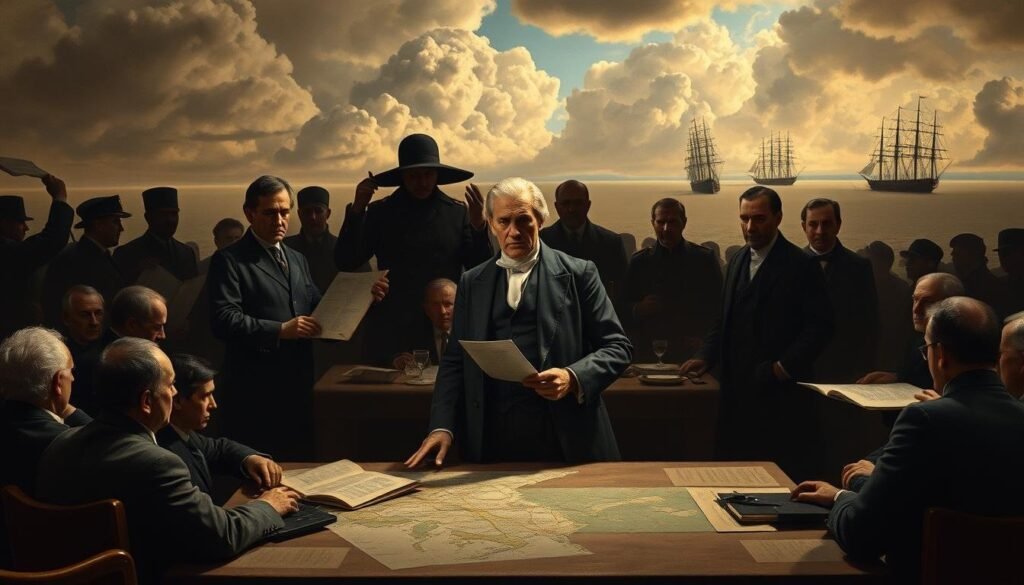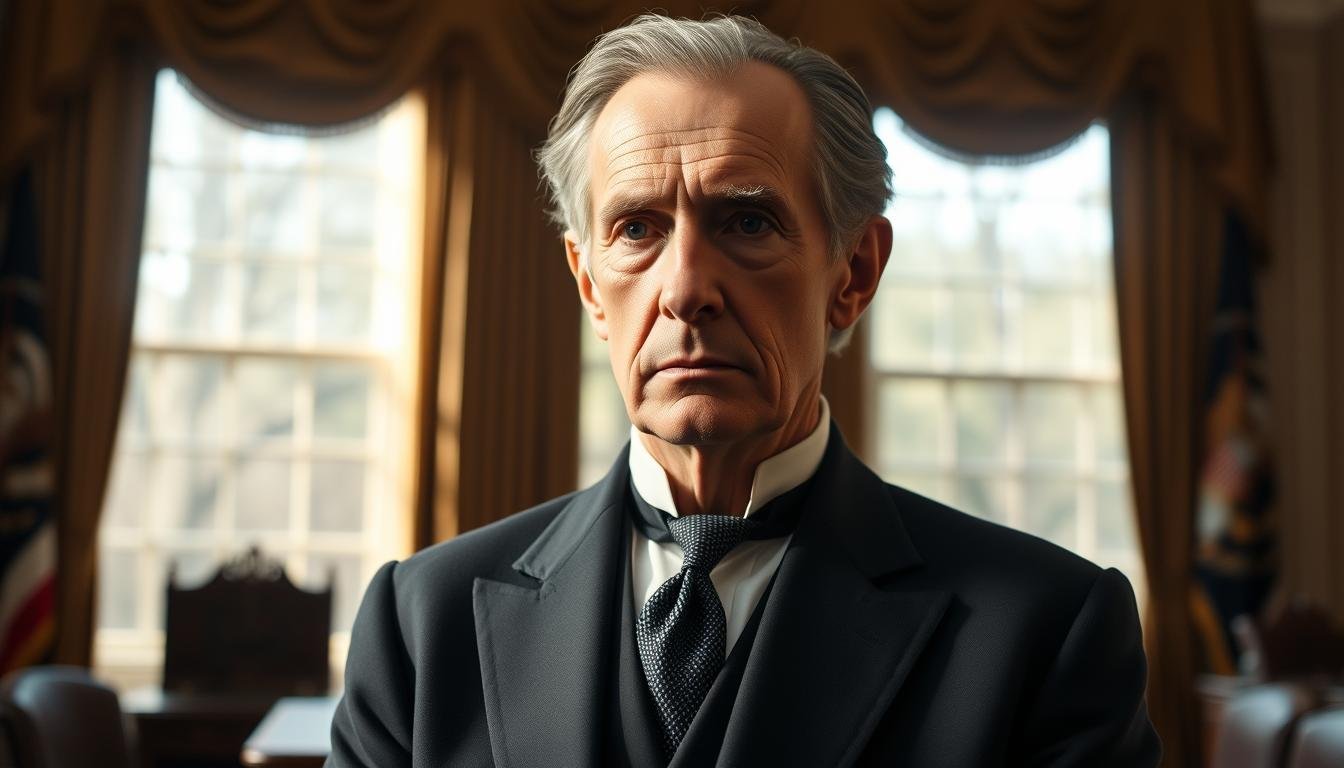Why Was John Tyler a Poor President? Have you ever thought about John Tyler, the 10th President of the United States? His presidency was marked by challenges and decisions that shaped his legacy. Let’s dive into what made his time in office so significant.
Tyler’s actions during his presidency left a lasting mark. They contributed to his reputation for poor presidential performance. By looking at the historical context and key events, we can better understand his role in presidential history.
Contents
- 1 The Accidental President: Tyler’s Unexpected Rise to Power
- 2 Why Was John Tyler a Poor President? Political Isolation and Party Rejection
- 3 Failed Domestic Policies and Economic Turmoil
- 4 Foreign Policy Missteps and Territorial Controversies
- 5 Administrative Chaos and Constitutional Conflicts
- 6 Conclusion: Why Was John Tyler a Poor President?
- 7 FAQ
- 7.1 Why is John Tyler considered a poor president?
- 7.2 What led to John Tyler’s unexpected rise to power?
- 7.3 How did John Tyler’s policies affect his relationship with the Whig party?
- 7.4 What were some of the significant domestic policy failures during John Tyler’s presidency?
- 7.5 What was the Webster-Ashburton Treaty, and how did it impact U.S.-British relations?
- 7.6 What were the implications of John Tyler’s efforts to annex Texas?
- 7.7 How did John Tyler’s interpretation of presidential powers affect his presidency?
- 7.8 What is John Tyler’s lasting legacy in American history?
The Accidental President: Tyler’s Unexpected Rise to Power
John Tyler became president after Harrison’s sudden death, changing American politics. As Harrison’s vice president, Tyler’s role was seen as a stepping stone, not a path to the presidency.
When Harrison died just one month into his term, the nation faced a new situation. It was the first time a president had died in office. This event changed Tyler’s life and set a key precedent for future presidential succession.
Tyler’s rise to the presidency was met with confusion and controversy. Many wondered if he should just act as president until a new election or if he should fully take the office. Tyler decided to take the oath and fully become president, setting a precedent for future vice presidents.
This moment in history shows the challenges Tyler faced as the “accidental president.” He had to prove his authority and legitimacy, a tough task given his unexpected rise.
Understanding Tyler’s rise to power is key to understanding his presidency. He faced challenges like political isolation and party rejection, which we’ll look at in more detail later.
Why Was John Tyler a Poor President? Political Isolation and Party Rejection
John Tyler’s presidency was marked by political isolation. This was a big reason he wasn’t very effective. He became president after William Henry Harrison died. But, Tyler’s choices quickly made him unpopular with the Whig party, which had backed Harrison.
His views on states’ rights and vetoes of important laws, like the Second Bank’s re-charter, hurt his relationship with the Whigs. Many saw his actions as a betrayal. This led to a formal censure and his eventual expulsion from the party.
Being isolated politically had big effects on Tyler’s ability to lead. Without Whig support, he found it hard to get laws passed. His time in office was marked by gridlock and inefficiency.
Key Factors Contributing to Tyler’s Political Isolation
- His veto of the re-charter of the Second Bank of the United States, a cornerstone of Whig economic policy.
- His strong stance on states’ rights, which conflicted with the more federalist views of many Whigs.
- The appointment of cabinet members who were not aligned with Whig ideology, further distancing him from the party.
| Event | Date | Consequence |
|---|---|---|
| Veto of the Second Bank Re-charter | July 1842 | Strained relations with the Whig party |
| Expulsion from the Whig Party | September 1841 | Loss of political support and legitimacy |
| Resignation of Cabinet Members | September 1841 | Administrative chaos and further isolation |
The effects of Tyler’s isolation were huge. They didn’t just hurt his presidency but also the country’s politics. His struggles with Congress and his own party led to failed policies and economic problems. These issues made life hard for his successors.
Failed Domestic Policies and Economic Turmoil
Tyler’s decisions on domestic issues, like the banking system and tariffs, had big effects on the economy. One big challenge was the re-chartering of the Second Bank of the United States. This was a topic of debate for years.
The Second Bank of the United States was key for a stable national currency and managing government finances. But Tyler vetoed the bill to re-charter the bank. He sided with his Democratic allies who didn’t like the bank’s power. This move caused a big split in his own Whig party and had big effects on the nation’s banking.
Without a central bank, many state-chartered banks started, each with their own money. This made the banking system spread out and unstable, causing economic problems. The lack of a single currency and the many banknotes from different states made things worse.
Also, Tyler’s views on tariffs added to the economic troubles. The Tariff Act of 1842, signed by Tyler, lowered tariffs but still helped American industries. But the tariff debate kept going, showing the struggle to please all parts of the country.
Infrastructure projects were another area where Tyler’s policies had big effects. He supported projects like roads and canals to help the economy. But these projects were often slow and had corruption, making things harder for the economy.
The effects of these policies were economic instability. The lack of a good banking system, ongoing tariff debates, and problems with infrastructure projects all added to the troubles during Tyler’s time.
In summary, John Tyler’s domestic policies, especially on banking, tariffs, and infrastructure, had big effects on the economy. Understanding these policies helps us see the challenges the nation faced during his time. This is why he is seen as a poor president.
Foreign Policy Missteps and Territorial Controversies
John Tyler’s presidency was marked by several foreign policy missteps and territorial disputes. One major challenge was the border dispute with British North America. This was resolved through the Webster-Ashburton Treaty.
The Webster-Ashburton Treaty, signed in 1842, was a key agreement. It helped settle border issues between the U.S. and British North America. This treaty marked a significant step in improving U.S.-British relations by establishing a clear boundary between the U.S. and the Canadian territories.

Tyler’s administration also dealt with the issue of Texas annexation. The Republic of Texas declared its independence from Mexico in 1836. Tyler wanted to expand U.S. territory, driven by the idea of Manifest Destiny.
| Treaty/Agreement | Year | Implications |
|---|---|---|
| Webster-Ashburton Treaty | 1842 | Resolved border disputes between the U.S. and British North America |
| Texas Annexation Treaty | 1844 | Paved the way for Texas to become a U.S. state in 1845 |
These foreign policy decisions and territorial controversies show the complexities of Tyler’s presidency. The Webster-Ashburton Treaty was seen as a success. But the annexation of Texas added to the debate over slavery and states’ rights, dividing the nation further.
Administrative Chaos and Constitutional Conflicts
John Tyler’s presidency was filled with chaos due to his unique view of presidential powers. He became the first vice-president to take over after a president’s death. This made setting his authority a big challenge.
One major cause of chaos was Tyler’s use of the veto. He vetoed several important bills from the Whig party, which he used to be a part of. This led to big fights with Congress, the first time a veto was ever overridden.
But Tyler’s troubles didn’t stop there. His own cabinet members quit because of his policies. This made his administration even more unstable.
Key Administrative Challenges
- Constitutional disputes over the re-charter of the Second Bank of the United States
- Internal improvements and tariff bills that Tyler vetoed, leading to Whig opposition
- States’ rights issues, particularly regarding the annexation of Texas
| Issue | Tyler’s Action | Consequence |
|---|---|---|
| Re-charter of the Second Bank | Vetoed the bill | Whig opposition intensified |
| Tariff Bills | Vetoed several bills | Economic instability and regional dissatisfaction |
| Annexation of Texas | Supported annexation | States’ rights debate escalated |
These actions and conflicts show how much chaos Tyler’s presidency faced. His leadership and decisions strained his relationship with Congress. They also led to big constitutional debates.
In summary, John Tyler’s presidency was filled with big challenges and debates. His view of presidential powers and the fights with other branches of government show the complex nature of presidential authority.
Conclusion: Why Was John Tyler a Poor President?
John Tyler’s presidency faced many challenges and controversies. These included political isolation and foreign policy mistakes. His decisions and actions led to a negative legacy.
Assessing Tyler’s presidency is complex. It was influenced by his failed domestic policies and administrative issues. His legacy offers insights into presidential history.
Tyler’s experience shows the challenges of being a president. It highlights the need for effective policies and diplomacy. Reflecting on his presidency helps us understand how a president’s actions shape history.
See Also: Is President Obonjo a Real President?
FAQ
Why is John Tyler considered a poor president?
John Tyler is seen as a poor president because of his isolation, failed policies, and mistakes in foreign affairs. His presidency was also marked by chaos.
What led to John Tyler’s unexpected rise to power?
John Tyler became president after William Henry Harrison died early in his term. This made Tyler the first vice president to take over as president.
How did John Tyler’s policies affect his relationship with the Whig party?
Tyler’s policies, like his vetoes and views on states’ rights, pushed him away from the Whig party. This made it hard for him to lead effectively.
What were some of the significant domestic policy failures during John Tyler’s presidency?
Tyler’s presidency saw failures in banking, tariffs, and infrastructure. These issues led to economic troubles.
What was the Webster-Ashburton Treaty, and how did it impact U.S.-British relations?
The Webster-Ashburton Treaty helped solve border issues and improved U.S.-British relations. Yet, its negotiation and terms were also criticized, showing Tyler’s foreign policy challenges.
What were the implications of John Tyler’s efforts to annex Texas?
Tyler’s push to annex Texas was a major issue during his presidency. Although it succeeded, it added to the complexity of his legacy.
How did John Tyler’s interpretation of presidential powers affect his presidency?
Tyler’s views on presidential powers led to conflicts with Congress and the judiciary. This caused chaos and constitutional issues during his presidency.
What is John Tyler’s lasting legacy in American history?
Tyler’s presidency is remembered for its challenges and controversies. His decisions offer a complex view of his time in office and its place in American history.

Hi, I am Tatum Bradford from Washington. I have a background in political science and work as a senior revenue officer. I love learning about U.S. presidents and sharing interesting facts about political history.

